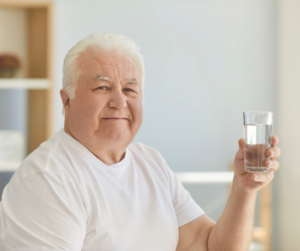The Impact of Dehydration on Seniors
 For individuals of all ages, dehydration can be a major health risk, but it can be particularly harmful to seniors. This is because the body changes with age, increasing its vulnerability to dehydration and its potentially dangerous effects. With the help of loved ones and home care, seniors can better maintain their health and well-being in regard to dehydration, as well as understand the signs, symptoms, and ways to prevent dehydration.
For individuals of all ages, dehydration can be a major health risk, but it can be particularly harmful to seniors. This is because the body changes with age, increasing its vulnerability to dehydration and its potentially dangerous effects. With the help of loved ones and home care, seniors can better maintain their health and well-being in regard to dehydration, as well as understand the signs, symptoms, and ways to prevent dehydration.
Why Dehydration Is More Common in Seniors
Seniors are more likely to become dehydrated for a number of reasons, including:
- Diminished Thirst Sensation: As people get older, they experience less thirst. This implies that even if their bodies require water, seniors might not feel thirsty. Knowing this, it’s important for them to receive gentle reminders to drink throughout the day. Both home care and loved ones can assist with this.
- Decreased Kidney Function: With age, the kidneys lose some of their ability to retain water, which might cause seniors to lose more fluids overall.
- Medication Side Effects: Dehydration can be even more of an issue if seniors are taking medications that increase urination or limit fluid intake. If this is the case, reminders to drink throughout the day become even more important.
- Chronic Health Conditions: Heart and kidney disease, diabetes, and other conditions can make seniors more susceptible to dehydration.
Signs of Dehydration in Seniors
It’s critical to identify dehydration symptoms early on. Some of those symptoms may include:
- A dry feeling in their tongue or mouth
- Eyes that look sunken
- Reduced urination
- Feeling lightheaded or dizzy
- Feeling lost or confused
- Weakness and Exhaustion
It’s important to note that severe dehydration can result in dangerous side effects such as kidney stones, UTIs, and even hospital admissions.
Preventing Senior Dehydration
When it comes to dehydration, prevention is the best course of action. The following advice can help seniors drink more water:
- Encourage Regular Fluid Intake: As mentioned above, even when seniors don’t feel thirsty, they should make an effort to drink water throughout the day. Using a schedule or setting reminders can be beneficial, as can encouragement from home care and loved ones.
- Choose Hydrating Foods: Foods with a high water content can help increase total fluid consumption. Examples of these foods include fruits (like watermelon and oranges) and vegetables (like cucumbers and lettuce).
- Consistent Monitoring: For seniors at risk of dehydration, it’s important for home health and loved ones to monitor their fluid intake closely.
- Manage Medical Conditions: It’s important for seniors to manage any long-term illnesses that could raise the risk of dehydration by working with medical professionals to make any necessary adjustments. Also, if medications are causing dehydration, seniors can be encouraged to talk with their team to see if there are alternative medications they could take.
Senior dehydration is a preventable issue that can have detrimental effects on health. Home care and loved ones can assist seniors in maintaining their health and quality of life by being aware of the issues they may encounter and taking proactive measures to ensure that they are adequately hydrated.
